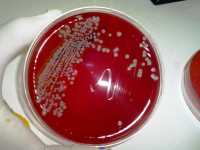
12 Oct Probiotic May Eliminate Staph Bacteria Colonizations
MedicalResearch.com Interview with:
 Pipat Piewngam
Pipat Piewngam
Postdoctorol fellow
Pathogen Molecular Genetics Section,
Laboratory of Bacteriology,
NIAID/NIH
Bethesda, MD, USA 20892
MedicalResearch.com: What is the background for this study? What are the main findings?
Response: Our team at National Institutes of health, Mahidol University and Rajamangala University of Technology in Thailand has reported that the consumption of probiotic Bacillus bacteria comprehensively abolishes colonization with the dangerous pathogen, Staphylococcus aureus.
We hypothesized that the composition of the human gut microbiota affects intestinal colonization with S. aureus. We collected fecal samples from 200 healthy individuals from rural populations in Thailand and analyzed the composition of the gut microbiome by 16S rRNA sequencing. Surprisingly, we did not detect significant differences in the composition of the microbiome between S. aureus carriers and non-carriers. We then sampled the same 200 people for S. aureus in the gut (25 positive) and nose (26 positive). Strikingly, we found no S. aureus in any of the samples where Bacillus were present.
In mouse studies, we discovered S. aureus Agr quorum-sensing signaling system that must function for the bacteria to grow in the gut. Intriguingly, all of the more than 100 Bacillus isolates we had recovered from the human feces efficiently inhibited that system. Then, we discovered that the fengycin class of Bacillus lipopeptides achieves colonization resistance by inhibiting that system.
To further validate their findings, we colonized the gut of mice with S. aureus and fed them B. subtilis spores to mimic probiotic intake. Probiotic Bacillus given every two days eliminated S. aureus in the guts of the mice. The same test using Bacillus where fengycin production had been removed had no effect, and S. aureus grew as expected. This is one of the first study that provide human evidence supporting the biological significance of probiotic bacterial interference and show that such interference can be achieved by blocking a pathogen’s signaling system.
MedicalResearch.com: What should readers take away from your report?
Response: The main message is that Bacillus-containing probiotics produce can comprehensively abolish colonization with S. aureus. It may be used for simple and safe S. aureus decolonization strategies.
MedicalResearch.com: What recommendations do you have for future research as a result of this study?
Response: One strategy to prevent Staph infections is to eliminate S. aureus colonization. However, some decolonization strategies are controversial because they require considerable amounts of topical antibiotics and have limited success, partly because they target only the nose and bacteria quickly recolonized from the gut.
The success of S. aureus decolonization by probiotic Bacillus is highly valuable translational applications regarding alternative strategies to combat antibiotic-resistant S. aureus. Probiotic Bacillus can comprehensively eradicate intestinal as well as nasal S. aureus colonization. Such a probiotic approach would have multiple advantages over the current standard topical strategy with antibiotics, which is aimed exclusively at decolonizing the nose.
MedicalResearch.com: Is there anything else you would like to add?
Response: Based on our observation, we next plan to test whether a probiotic product that contains only B. subtilis can eliminate S. aureus in people. We will enroll more Thai volunteers for the project. We hope that Bacillus-containing probiotics can be simply used and safe forS. aureus decolonization and new ways to fight S. aureus infections.
Citation:
Pipat Piewngam, Yue Zheng, Thuan H. Nguyen, Seth W. Dickey, Hwang-Soo Joo, Amer E. Villaruz, Kyle A. Glose, Emilie L. Fisher, Rachelle L. Hunt, Barry Li, Janice Chiou, Sujiraphong Pharkjaksu, Sunisa Khongthong, Gordon Y. C. Cheung, Pattarachai Kiratisin, Michael Otto. Pathogen elimination by probiotic Bacillus via signalling interference. Nature, 2018; DOI: 10.1038/s41586-018-0616-y
[wysija_form id=”3″]
[last-modified]
The information on MedicalResearch.com is provided for educational purposes only, and is in no way intended to diagnose, cure, or treat any medical or other condition. Always seek the advice of your physician or other qualified health and ask your doctor any questions you may have regarding a medical condition. In addition to all other limitations and disclaimers in this agreement, service provider and its third party providers disclaim any liability or loss in connection with the content provided on this website.
Last Updated on October 12, 2018 by Marie Benz MD FAAD
